If you’re in the market for reliable, long-lasting, and high-performing brake pads, Dynamic Friction (DFC) should be at the top of your list.
Whether you’re looking for smooth, quiet stops or want something that feels close to original equipment manufacturer (OEM) quality without the hefty price tag, Dynamic Friction brake pads offer all that and more.
I’ve tried them myself, and in this review, I’ll walk you through my experience, highlighting the pros, cons, and why they might just be the perfect fit for your vehicle.
My Experience With Dynamic Friction Brake Pads
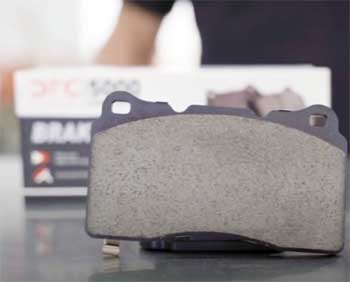
When it comes to brake pads, we all want a product that not only provides excellent stopping power but also delivers consistent performance over time.
After all, there’s nothing worse than spending money on brake pads that start making noise or lose their effectiveness after a few months.
After reading numerous reviews and doing some research, I decided to try out the Dynamic Friction 5000 Advanced Formulation brake pads for my car.
Let me tell you, they didn’t disappoint.
The first thing I noticed was how well-packaged everything was. The kit included shims, wear indicators, and fitment shims, and it was all ready to go right out of the box.
The brake pads themselves were plastic-wrapped, and while they were a little sooty, a quick clean with brake parts cleaner fixed that. Installation was straightforward, and the fitment was as good as OEM pads, which is always a relief.
But the real test was how these pads performed on the road.
- Performance You Can Count On
From the first stop, I could tell these pads were designed with performance in mind. One of the things that stood out was how quiet they were. No screeching, no vibrations, and no weird noises, even in damp conditions.
That’s a big plus for me because noisy brakes can be a real headache.
The stopping power was consistent and predictable, which is something I value. There was no fade, even during aggressive braking. The pedal feel was responsive, and I felt in complete control.
If you’ve ever experienced brake fade on a steep hill or during hard stops, you know how unnerving that can be, and thankfully, that wasn’t an issue with these pads.
While some users have mentioned that the bite of these pads isn’t quite as aggressive as OEM pads, I didn’t feel like I was losing any stopping ability.
In fact, after pairing the pads with a set of aftermarket Centric rotors, I found that my braking was smoother than before, with none of the pulsation issues I experienced with my old setup.
Pros of Dynamic Friction Brake Pads
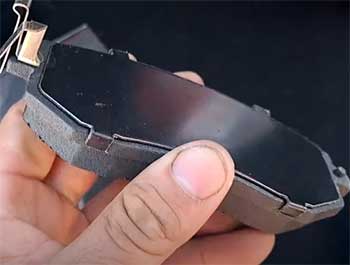
- Quiet and Smooth Operation: Dynamic Friction brake pads are engineered to reduce noise, and they deliver on that promise. I’ve been using these pads for months now, and they’re as quiet as the day I installed them, even in damp or cold weather.
- Rotor-Friendly: One of the biggest selling points for me was the claim that these pads are rotor-friendly. I’ve had issues in the past with pads that wear down rotors too quickly, costing me more in the long run. DFC pads, on the other hand, have shown minimal wear on my rotors, which means fewer replacements and longer-lasting performance.
- Consistent Pedal Feel: This is crucial when you’re driving in heavy traffic or going down steep hills. The consistent pedal feel gives you confidence that the brakes will respond exactly how you expect, every time.
- Comes with a Complete Hardware Kit: This is something I didn’t expect but really appreciated. The kit includes everything you need for installation, from wear indicators to shims. You don’t have to worry about buying additional parts or reusing old hardware that might not perform as well.
- Great Value for the Money: Compared to OEM pads, DFC pads are reasonably priced, especially considering the hardware kit is included. If you’re on a budget but don’t want to compromise on quality, these are a solid choice.
Cons of Dynamic Friction Brake Pads
- Initial Dustiness: The pads were a bit sooty right out of the box, and while this didn’t affect performance, it was something I had to clean off before installation. It’s a minor inconvenience, but worth mentioning.
- Slightly Less Aggressive Bite: Some users have noted, and I’ve noticed as well, that the initial bite isn’t quite as aggressive as OEM pads. This didn’t bother me, as the overall stopping power was still great, but if you’re someone who prefers an aggressive bite, it’s something to consider.
- Limited Availability for Certain Models: While DFC pads are available for a wide range of vehicles, there are some models where the choices are limited. I had no issue finding a kit for my car, but it’s worth checking availability before committing.
How To Get The Most Out Of Your Dynamic Friction Brake Pads?
Once you’ve installed your DFC brake pads, there are a few things you can do to maximize their lifespan and performance. Here are my top tips for getting the most out of your brake pads:
- Proper Break-In: The break-in period is critical for ensuring the pads perform well over the long haul. DFC pads are scorched during manufacturing to minimize the break-in period, but it’s still a good idea to take it easy on your brakes for the first 200 miles or so. Avoid hard stops, if possible, and allow the pads to bed into the rotors.
- Regular Cleaning: Brake dust can accumulate on your wheels and rotors, which can impact performance. Make a habit of cleaning your brake components with brake cleaner during regular maintenance to keep everything working smoothly.
- Check Your Rotors: While DFC pads are rotor-friendly, it’s still important to regularly check the condition of your rotors. If you notice uneven wear or warping, it might be time to replace them. Healthy rotors will extend the life of your brake pads.
- Use Quality Rotors: I paired my DFC pads with Centric rotors, and I highly recommend investing in quality rotors. Cheaper rotors can wear down more quickly and affect the overall performance of your braking system. If you want the best results, don’t skimp on the rotors.
Comparison With Other Brands
When it comes to brake pads, the competition is fierce. There are plenty of brands on the market, but how do Dynamic Friction brake pads stack up?
- Dynamic Friction Vs. Wagner Brake Pads
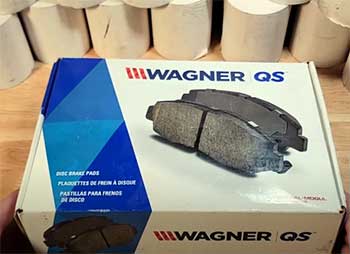
Wagner is a well-known name in the brake industry, especially for their ThermoQuiet line.
Wagner brake pads are often praised for their noise reduction technology and long lifespan.
However, when it comes to direct comparison with DFC, I found a few key differences.
Both Wagner and DFC are excellent at keeping noise to a minimum, but DFC pads tend to offer smoother, more consistent pedal feel over time.
Wagner pads are known for being durable, but some users have reported increased brake dust compared to DFC.
In contrast, I’ve experienced less dust with Dynamic Friction, which is a huge plus if you’re looking to keep your wheels cleaner.
When it comes to price, Wagner pads can sometimes be a little cheaper than DFC, but they don’t always include the full hardware kit that DFC provides. So, if you’re looking for convenience and ease of installation, DFC edges out Wagner.
- Dynamic Friction Vs. Akebono Brake Pads
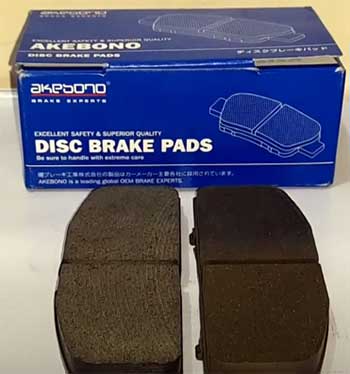
Akebono is renowned for its ceramic brake pads and is often seen as a premium choice, especially for those who prioritize ultra-quiet and smooth braking.
Their ProACT ceramic line is a popular option, and it’s easy to see why: Akebono pads are well-regarded for their low noise, minimal dust, and long lifespan.
However, this premium quality comes with a higher price tag.
In terms of performance, Akebono pads and DFC pads are comparable in many areas.
Both brands offer excellent noise reduction and are rotor-friendly, meaning they help extend the life of your rotors.
However, if you’re looking for a more budget-friendly option that still delivers strong, consistent braking, Dynamic Friction pads may be a better choice. Akebono is known for longer pad life, but unless you’re driving in extreme conditions, DFC’s lifespan holds up just as well for most daily drivers.
- Dynamic Friction Vs. Bendix Brake Pads
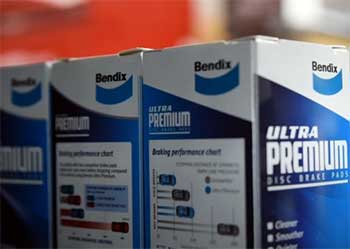
Bendix is another reputable brand, particularly known for their Fleet Metlok and Premium lines.
Bendix pads are great for high-performance and heavy-duty applications, offering excellent stopping power and durability.
However, for everyday driving, they can sometimes be overkill, especially if you’re not pushing your vehicle to its limits.
When compared to Dynamic Friction, Bendix brake pads might offer a bit more in terms of aggressive stopping power, especially in fleet or towing situations. However, for regular day-to-day driving, DFC pads provide a more balanced and smoother experience.
Additionally, Bendix brake pads tend to produce more noise and brake dust compared to DFC, particularly during heavy braking.
Price-wise, Bendix pads can be more expensive than DFC, particularly in their higher-end lines. If you’re looking for strong, reliable performance but don’t need the extra power that Bendix offers, Dynamic Friction brake pads deliver excellent value with smoother, quieter performance.
Frequently Asked Questions (FAQs)
Dynamic Friction brake parts are made by the Dynamic Friction Company (DFC), which specializes in producing high-quality brake components designed to meet or exceed OEM standards.
Yes, DFC is known for making reliable, high-performing brake pads that offer consistent braking, noise reduction, and rotor-friendly design. They provide excellent value for the price and are a great alternative to OEM pads.
There isn’t a definitive “best” brand for brake pads, as it depends on your vehicle and driving needs. Brands like Dynamic Friction, Bosch, and EBC all offer quality pads, each with its strengths. DFC is great for quiet, smooth stopping and affordability.
Yes, Dynamic Friction also makes high-quality calipers that are known for durability and performance, complementing their brake pads for a complete braking system solution.
Conclusion: A Smart Choice For Your Vehicle
After using Dynamic Friction brake pads for an extended period, I can confidently say they’re a great option for drivers who want quality without the OEM price tag.
The combination of quiet, smooth performance, rotor-friendly design, and an included hardware kit makes them an excellent choice for everyday driving. If you’re looking to upgrade your brakes, I highly recommend giving Dynamic Friction a try.

